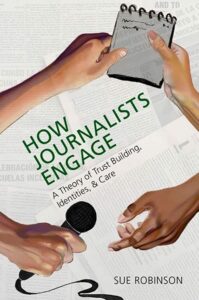By Caroline Crowley
The journalism industry in the United States has been in economic and cultural crisis for decades, and one professor is documenting the efforts to save it.

Sue Robinson, Helen Firstbrook Franklin Professor of Journalism at the School of Journalism and Mass Communication, recently published How Journalists Engage: A Theory of Trust Building, Identities, and Care, a book exploring trust building in journalism.
The book, published in May 2023 with the Oxford University Press, uses four years of collaboration with journalists through case studies, focus groups, interviews and community work to develop methods for journalists to build connections and trust with communities.
Robinson set out to investigate the emergent engagement journalism movement that has taken over the mainstream industry in the United States over the last 15 years, including the millions of dollars and other resources being spent to retrain journalists toward engagement practices.
“What I wanted to do was document that movement and pick apart what was really happening and whether journalism’s mainstream traditional tenets and principles were being changed because of the movement,” Robinson said.
This was accomplished through three phases:
- documenting the movement through a series of case studies of programs and initiatives propelling it to understand what she found to be eight new skillsets and four new roles for mainstream journalists;
- asking journalists through surveys, interviews and focus groups whether they had ever practiced these new roles and skillsets and what challenges they had to do so; and finally,
- testing out the new skillsets and roles through participant observation of trainings both in newsrooms and in Journalism School classrooms.
Through these phases of research, Robinson developed a new theory of trust building that focused on her term identity-aware caring: Trust building happens through the nurturing of personal, organizational, and institutional relationships that people have with information, sources, news brands, journalists and each other during what is commonly referred to as engagement. Furthermore, for trust building to occur, journalistic engagement needs to be practiced with identity-aware caring and enacted through listening and learning.
As one exemplar in her book, Robinson collaborated with UW–Madison’s Field Day Lab to create a video game about a reporter navigating trust building with sources and within a community during a flood in a small town. The game highlighted her concept around identity-aware caring as the reporter progressed through the game by winning over sources who had assumptions about her and through acts of caregiving.
 “I put together a team to consult with the game designers and it was just so fun for me to see the principles of my book sort of playing out organically in this game,” Robinson said. “In order to win the game, you have to display care, and that’s the conclusion of my book.”
“I put together a team to consult with the game designers and it was just so fun for me to see the principles of my book sort of playing out organically in this game,” Robinson said. “In order to win the game, you have to display care, and that’s the conclusion of my book.”
In the past, Robinson said reporters have cared about democracy, truth, facts and ethics as well as other more abstract conceptualizations. However, How Journalists Engage highlights the importance of relational care for individuals and communities.
While journalists and researchers don’t know for certain if retraining with community-building strategies will work, Robinson said the field has reached a pivotal moment.
“We do not know if this incredible, massive retraining is the right way to go,” Robinson said. “But we have a lot of anecdotal evidence that trust building in these ways works with people, and I just find that fascinating.”
Many student researchers, student journalists, and journalists helped Robinson research and publish her book.
“This book was a product of a lot of people’s efforts that helped me along the way, so a big shout out to them because this is their book as much as my book,” Robinson said.
You can find her book on the Oxford University Press website.